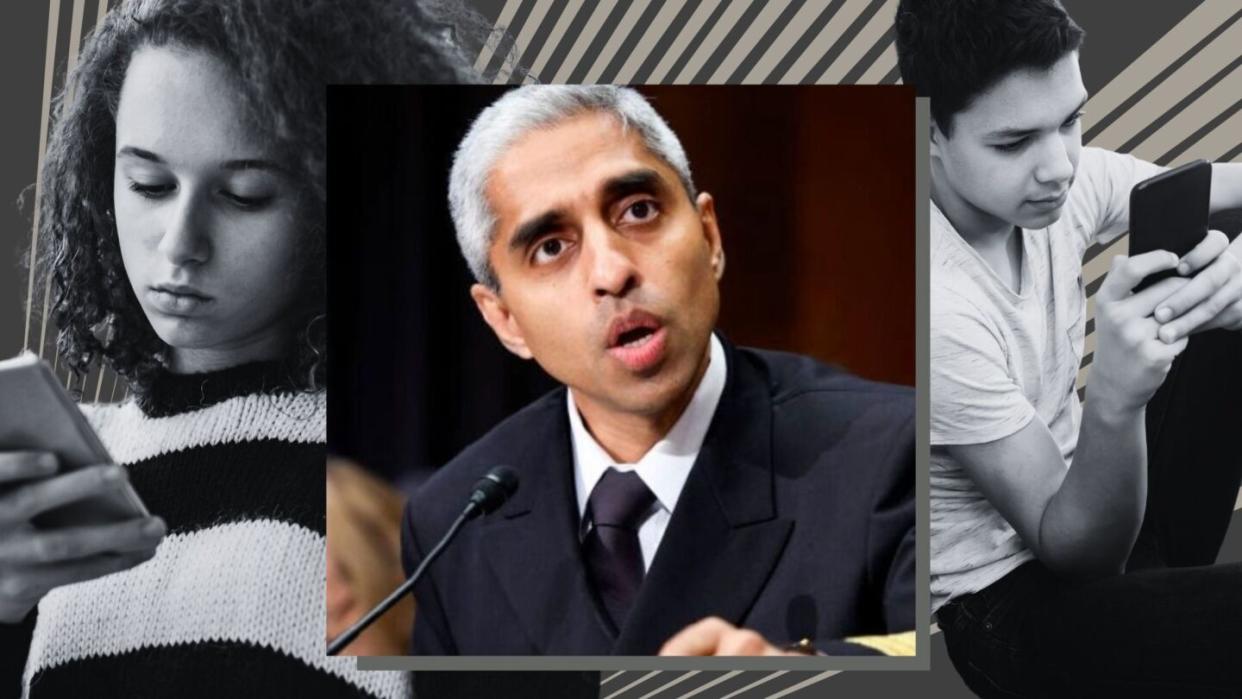The Surgeon General just called for a warning label for social media apps—here’s why

The Surgeon General, Dr. Vivek Murthy, is demanding Congress put labels on social media apps—just like with cigarettes and alcohol—because these apps pose a risk of harm to the mental health and well-being of children and adolescents.
In an op-ed for The New York Times on Monday, Dr. Vivek Murthy said that social media is a contributing factor in the mental health crisis among young people. Murthy cited several studies, including a 2019 American Medical Association study published in JAMA that showed teens who spend three hours a day on social media double their risk of depression. Teens spend nearly five hours a day on social media apps, according to a Gallup poll.
“It is time to require a surgeon general’s warning label on social media platforms, stating that social media is associated with significant mental health harms for adolescents. A surgeon general’s warning label, which requires congressional action, would regularly remind parents and adolescents that social media has not been proved safe,” Murthy said. “Evidence from tobacco studies show that warning labels can increase awareness and change behavior.”
Murthy acknowledged that the use of a warning label wouldn’t necessarily make social media safe for young people, but is still part of the process.
“Social media today is like tobacco decades ago: It’s a product whose business model depends on addicting kids. And as with cigarettes, a surgeon general’s warning label is a critical step toward mitigating the threat to children,” Josh Golin, executive director at Fairplay, an organization that is dedicated to ending marketing to children, said in a statement.
The impact of social media on developing young minds
Last year, Murthy released a social media advisory warning parents and caregivers of the “profound risk of harm” social media presents in children and teens.
According to the 25-page advisory, up to 95% of youth between the ages of 13 and 17 report using a social media platform, with more than one-third saying they use social media “almost constantly.” Though the most common minimum age required for social media platforms is 13, nearly 40% of U.S. children between the ages of 8 and 12 use social media. The advisory also urged tech companies to strengthen protections for kids on social media and recommended age limits, content advisories, and design changes to cut down on harmful algorithms promoting harmful influences.
Breaking News: The U.S. surgeon general called for a warning label on social media platforms that says they may damage adolescentsa?? mental health. https://t.co/t2jYUSIK13
— The New York Times (@nytimes) June 17, 2024
Currently, to comply with federal regulation, social media companies already ban kids under 13 from signing up for their platforms—but children have been shown to easily get around the bans, both with and without their parents’ consent.
Pros and cons of social media for adolescents and teens
Social media can have a significant impact on children’s mental health, both positive and negative.
Negative impacts:
Seeing idealized images and lives of others can increase feelings of inadequacy and lower self-esteem in children.
Children can be victims of online harassment, name-calling, rumors which can lead to anxiety, depression, and other issues.
Excessive social media use, especially at night, can disrupt sleep patterns crucial for development.
Feeling left out from online interactions can create social anxiety and alienation.
Social media use can become compulsive and displace other healthy activities like exercise and face-to-face interactions.
Positive impacts:
Helps children stay in touch with friends and family, find supportive communities of interest.
Allows children to explore identities, share creative outlets in a public space.
Exposes children to ideas from diverse sources on any topic.
Using social media can build technological literacy helpful for education and careers.
Safety is the overall concern of the Surgeon General
Murthy believes the impact of social media on young people is an enormous concern that needs action now.
“Why is it that we have failed to respond to the harms of social media when they are no less urgent or widespread than those posed by unsafe cars, planes or food? These harms are not a failure of willpower and parenting; they are the consequence of unleashing powerful technology without adequate safety measures, transparency or accountability,” he wrote.
According to Munthy’s op-ed, Congress needs to implement legislation that will protect young people from online harassment, abuse and exploitation and from exposure to extreme violence and sexual content.
“The measures should prevent platforms from collecting sensitive data from children and should restrict the use of features like push notifications, autoplay and infinite scroll, which prey on developing brains and contribute to excessive use,” Murthy wrote.
When it comes to social media use, moderation and mentoring is key—and each child is different. While social media certainly poses major risks and harm, it can also a positive space when used in age-appropriate and balanced ways with adequate oversight. Setting limits, educating on responsible use, and being aware of emotional impacts are recommended.
